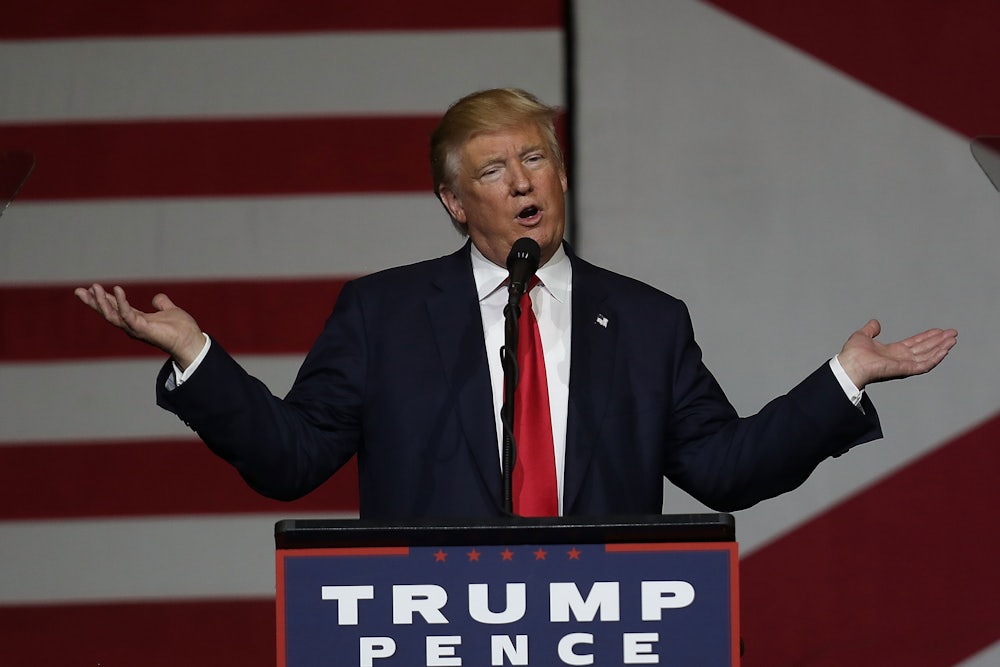Donald Trump reiterated Thursday that he’s preparing a lawsuit against The New York Times after the paper published what he called a “fabricated” account of new sexual assault allegations against the Republican nominee. “We already have substantial evidence to dispute these lies and it will be made public in an appropriate way,” he said at a rally in West Palm Beach, Florida.
This comes after Trump attorney Marc Kasowitz sent a letter to the Times on Wednesday in which he calls the article “nothing more than a politically motivated effort to defeat Mr. Trump’s candidacy,” says it “is reckless, defamatory and constitutes libel per se,” and threatens “all available actions and remedies” if the paper doesn’t retract it with an apology.
Such threats don’t seem to worry the Times. Its assistant general counsel, David McCraw, eviscerated Kasowitz’s libel claim in a letter on Thursday:
The essence of a libel claim, of course, is the protection of one’s reputation. Mr. Trump has bragged about his non-consensual sexual touching of women. He has bragged about intruding on beauty pageant contestants in their dressing rooms. He acquiesced to a radio host’s request to discuss Mr. Trump’s own daughter as a ‘piece of ass.’ Multiple women not mentioned in our article have publicly come forward to report on Mr. Trump’s unwanted advances. Nothing in our article has had the slightest effect on the reputation that Mr. Trump, through his own words and actions, has already created for himself.
McCraw later noted, “We did what the law allows: We published newsworthy information about a subject of deep public concern.” And then he practically begged the nominee to sue: “If Mr. Trump disagrees, if he believes that American citizens had no right to hear what these women had to say and that the law of this country forces us and those who would dare to criticize him to stand silent or be punished, we welcome the opportunity to have a court set him straight.”
A court almost certainly would.
“Trump has no case at all,” Laurence Tribe, a Harvard law professor, told The New Republic in an email.
“It’s really not even debatable,” said Nadine Strossen, former president of the American Civil Liberties Union.
Both Tribe and Strossen said Trump would need to meet the legal standard of the landmark Supreme Court case New York Times Co. v. Sullivan and prove, in Tribe’s words, that the story “was factually false and that the Times either knew that it was false or was reckless in the story’s creation and reporting.”
“Trump could not possibly meet that standard,” Tribe said, “and his case would be dead on arrival. It wouldn’t even reach the discovery stage.”
The only way Trump’s lawsuit “might get to first base,” Tribe said, would be if Trump, as president, somehow fulfilled his promise to “open up” libel laws, making it easier to sue news organizations.
But here, too, experts are highly skeptical.
“There’s no clear way you can just step into office and change the libel laws,” said Gregg Leslie, legal defense director at the Reporters Committee for Freedom of the Press. And even if Trump did, Tribe said, “Unless he were to scuttle the First Amendment altogether, the suit wouldn’t make it.”
Trump has a long history of threatening lawsuits without following through, but it wouldn’t be the first time he sued a news organization. He’s even filed a defamation suit over a Facebook post, after Miss Pennsylvania contestant Sheena Monnin wrote on the site that the 2012 Miss USA Pageant was “rigged.” Oh, the irony.
